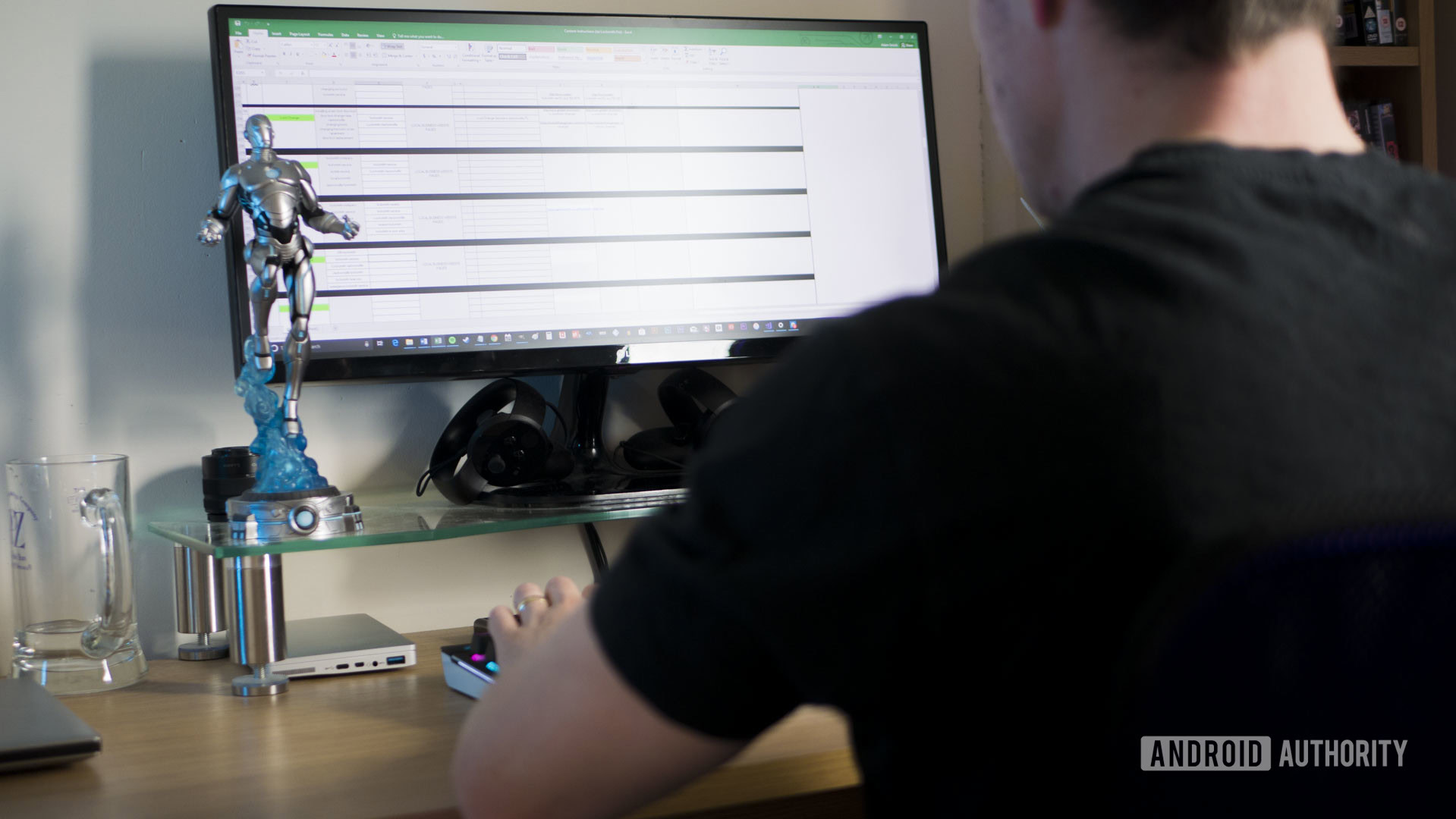Affiliate links on Android Authority may earn us a commission. Learn more.
How to stay sane working from home
Published onMarch 15, 2021
Before it was forced on them, a lot of my friends told me they’d love to work from home and were envious of my lifestyle as a writer. But then COVID-19 happened, countless offices were shut, and the reality of trying to stay sane working from a home office quickly began to sink in.
Sure, losing the hour-long commute is always a plus, and the constant access to coffee is nice. But for many people, working from home provides too much freedom and not enough structure. Then there’s the lack of social stimulation and the problems that stem from working and relaxing in the same environment (significantly compounded by lockdown).
Working from home provides too much freedom and not enough structure.
If your partner is also working from home, or perhaps looking after your kid also at home; that opens up a whole ton of other issues.
Also read: Stuck at home? Top 9 freelance sites for finding paid work online
I’ve seen this lifestyle shift get to people and even deter them from the work-from-home lifestyle entirely. So in this post, I’m going to share with you the tricks and strategies I’ve used to stay sane working from home for the past ten years. Relatively, anyway.
Keep work and downtime separate

You’ve likely heard this tip before: one of the most important things you can do to stay sane working from home is to separate your work life and downtime. The danger is that working from home makes it all too easy to squeeze in a bit of work after-hours; or conversely a smidge of Nintendo Switch during the day.
This results in a situation where you are simultaneously always working and never working. You’re constantly “half working,” meaning you’re not getting a ton of work done, but you’re never getting a chance to properly recover either.
Never switching off can place a strain on your relationship (apparently our partners want to “spend time with us”), and potentially lead to health issues (apparently our immune systems want us to “sometimes not be on edge”).
Also read: Best work from home apps, gadgets, and tools
To instill this kind of separation, it’s important you turn off work communications after you have clocked off. If your organization uses an app like Slack, you can simply pause notifications until you next want to be available. Don’t check your work emails, and leave your separate work phone in the office, if you have one.
Create a separate office
Speaking of which, having a separate office is also highly advisable if you want to stay sane working from home. Avoid working in the room that you unwind in, and definitely don’t work in the room that you sleep in if you can help it. This will create a psychological separation between the two spaces, such that you can enter a “work mode” while you’re in the office, and then relax once you have left. Otherwise, you might find you struggle to focus while working (because you’re surrounded by more enjoyable things) or even experience insomnia when trying to sleep.
If you don’t have this option, then a great tip from Thomas Frank is to set up a workspace at the start of the day, then take it down once you’re finished. This may involve a folding desk, or a work laptop stowed in a drawer somewhere. He recommends that this become almost a “ritual,” to the point that it helps mark the start and end of your working day.
An added bonus is that this makes it much harder to sneak in that after-hours email!
Create structure

In a similar vein, it’s important to instill structure. That means you should have a set time that you start work, and a strict time that you stop. Alternatively, you might stop once you have completed X amount of work, or met N conditions. Either way, a lack of structure can quickly lead to procrastination, late nights, and missed deadlines.
Lack of structure can quickly lead to procrastination, late nights, and missed deadlines.
A good way to think about this is the same way that you write workout goals. A big mistake is to set a goal to “lose two stone by next year.” Because this goal is so abstract and distant, it’s easy to delay the actual work. Skipped a workout? No problem: you have plenty of time to make up the lost time. Except that tomorrow and the next day are just as stressful and busy as today was, so you end up postponing your training again and again. Until eventually it’s too late.
This is what can happen to people who are given projects to work on from home for the first time. They only work for two hours on Monday and plan to catch up on Tuesday and Wednesday… Until that doesn’t happen. Eventually, this either comes back to bite them, or they end up working until 4am on Friday night. Not healthy!
Also read: Digital wellbeing: How to form a better relationship with your phone
This was a huge issue for me when I first started working online. I lived with my friend and essentially used this as a way to extend the university lifestyle: staying out late, sleeping until 1pm the next day, and then working extremely strange hours. It was fun in a way, but I was also constantly stressed, behind, and disheveled!
The irony is that when I moved in with my wife and adapted to her 9-5 lifestyle, I actually ended up having much more free time than I ever had before! That’s because I was working during set hours, and often finishing early.
I recently shared a video on my own YouTube channel with some tips as to how you can motivate yourself to get up and start work right away.
Don’t stay up working all night
This goes hand-in-hand with everything I’ve said so far, but just to be clear: do not stay up working all night!
Even when you fall behind. Even if you think that an email you need to send absolutely can’t wait; as soon as you start working late, it becomes a slippery slope. Nearly all of the “absolutely urgent work” that we think can’t wait will actually be just fine waiting until tomorrow. In fact, your boss or client is probably in bed!
Also read: How your smartphone is changing your brain
Moreover, the work we do at 1am tends to be so low-quality as to be better off ignored. I highly recommend the book The Four Hour Workweek by Tim Ferriss if you want some help getting over the (mostly imagined) idea that work must be done immediately!
Get dressed!
On another related note: get dressed! Just because no one will see you, that doesn’t mean you should work in your pajamas and dressing gown. This sets the wrong tone for the day and puts you in a lethargic state of mind. Getting showered and dressed helps wake you up and put you in a productive state of mind, and letting these things slide is once again a slippery slope.
Get your social interaction elsewhere
One of the biggest things we lose when we stop working in an office is social interaction. You may not be engaging in deep debates about life at work, but those fleeting interactions with colleagues as you make your way to the kitchen are key in helping you feel connected.
In lieu of those kinds of interactions then, it’s important that you get your social stimulation from elsewhere. What I used to do when I lived in London was to meet with friends who were on their lunch break to enjoy lunch together. I’d do this two or three times a week, and as a result I’d get to spend quality time with people I’d actually chosen to hang out with. Even better!

This is not an option during the current lockdown, but if you have a phone or Skype you can likewise arrange a 30-minute chat with a friend while you eat. Otherwise, you might be able to spend time with a partner or any family that are also at home. These days, I play with my young daughter on my lunch break!
Finally, make the effort to interact with your colleagues or even clients in other ways too. If you’re using an app like Slack, or just sending multiple emails in a day, why not ask how your work buddy is doing? Send a funny meme? Or just chat about world events?
We’re all in this together, and a little camaraderie can go a long way!
Have multiple work spots
Another thing I used to do to stay sane working from home, was to head out to beauty spots or more bustling areas in order work. My favorite options were coffee shops, the beach (on a deckchair with a laptop), and the British Library. More recently, I’ve been working in Oxford which has some beautiful hidden coffee shops down little cobbled alleys.
Unfortunately, this is no longer an option. But what you can do, is to go and sit on a couch to answer emails, or head outside to finish off that last bit of work. While keeping a separate “office space” is important and useful, occasionally moving position will help combat some ill health effects of staying frozen in place all day. Moreover, this can be a good way to wake yourself up and bring in some fresh ideas.
And these two tips don’t need to be contradictory either: you can create a space on a sofa in your office for example and sit there to answer emails (as it requires a little less focus).
Exercise and get outside

Just as you need to get your social stimulation from other sources, you also need to make sure you’re experiencing a genuine change of environment, along with some physical exercise/movement. Commuting to work might be a pain in the backside, but at least it forces you to get up and about! Spend all day in the same four walls and pretty soon you’ll be chasing your family around a maze and axing through doors (if you don’t know what I’m talking about… watch more films!).
This can be as simple as going for a daily walk. Personally, I like to do that on top of a workout in my garden. This ensures I get plenty of sunshine and vitamin D, and avoid letting my muscles turn to complete goop.
You can also benefit from a device called a “daylight lamp” which will produce light that has a similar wavelength to the sun.
Also useful is to try and incorporate smaller bits of movement throughout your day. You might commit to performing five pull ups every time you pass through a door-mounted pull up bar for example.
Movement is extremely important for our physical and mental health, so it’s important to make it a big part of your day.
Also read: Best home fitness tips, gear, and apps to keep you feeling your best
Closing comments
Many of these methods to stay sane working from home require a little discipline. Getting up and dressed at 7am when you don’t strictly need to might not be something you want to do. But just like eating your vegetables, doing this consistently will make you feel much better in the long run. This is about being disciplined with yourself. It’sforgetting what you want in the short term to pursue what you need in the long term.
This is about being disciplined with yourself.
If you do it right, working from home can offer and surpass almost all the benefits of working from an office. You can find time to chat to your real friends, take relaxing walks, and even create your own lifestyle and set your own working hours.
Don’t worry if that’s not where you’re at right now though. This is a huge lifestyle shift and like anything, it takes time and practice. Stick with it, make an effort, and you’ll find that working from home can actually do wonders for your productivity, creativity, and happiness!